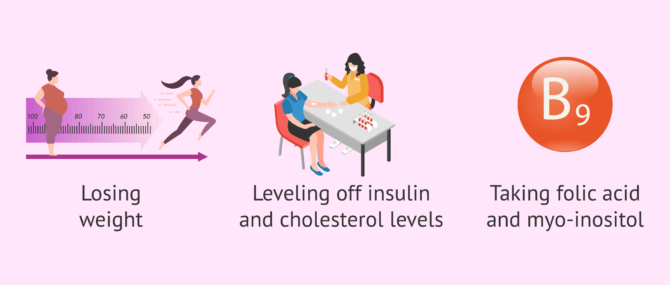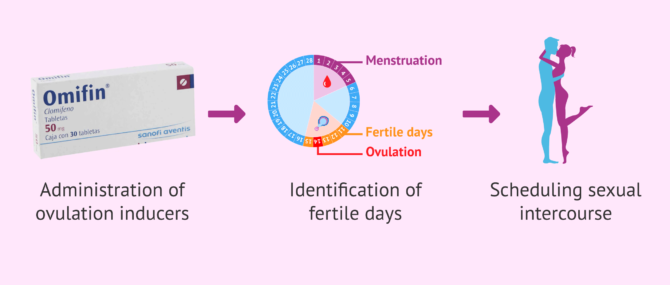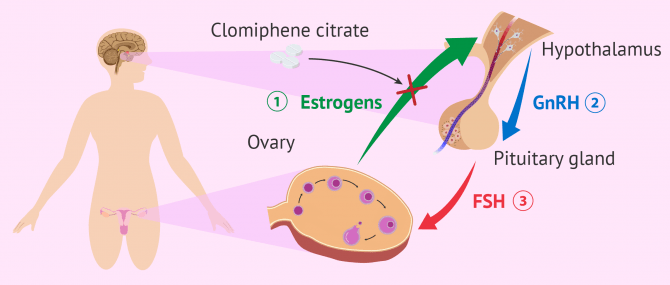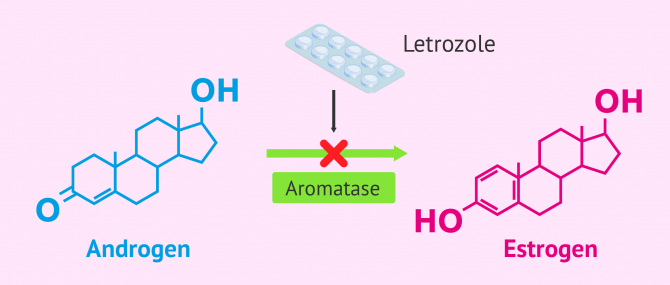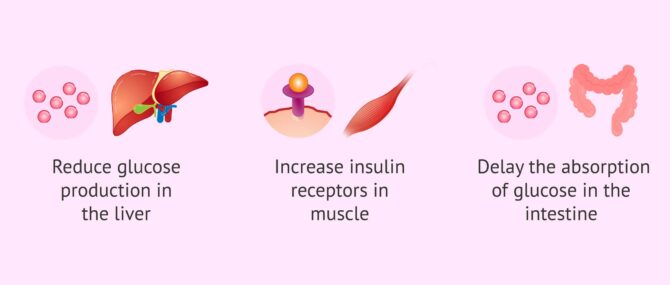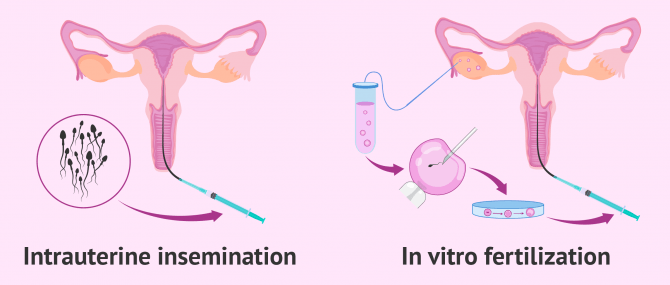Polycystic Ovary Syndrome (PCOS) is an endocrine disorder that affects female fertility directly by causing irregular menstrual periods and anovulation.
This is the reason why women with PCOS have greater difficulties for achieving pregnancy naturally.
In some cases, recovering fertility is possible by just modifying lifestyle habits, or inducing ovulation with medication. Other women have no alternative but to undergo Assisted Reproductive Technology (ART) to have children.
Provided below is an index with the 7 points we are going to expand on in this article.
- 1.
- 2.
- 2.1.
- 2.2.
- 2.3.
- 2.4.
- 3.
- 4.
- 4.1.
- 4.2.
- 4.3.
- 4.4.
- 4.5.
- 4.6.
- 4.7.
- 4.8.
- 5.
- 6.
- 7.
Natural pregnancy
The main cause of infertility in women with PCOS is the absence of ovulation due to hyperandrogenism (excess of male hormones). If the ovaries are unable to release a mature egg, neither fertilization nor pregnancy is possible.
Ovulation problems can be easily solved by establishing healthier lifestyle habits, such as starting a diet plan to lose weight in cases of overweight, or practicing moderate exercise.
In general, the recommendations to follow in order to regulate menstrual cycles and increasing the chances of getting pregnant naturally with PCOS are:
- Losing weight and practicing exercise for women with a BMI> 28 kg/m2.
- Leveling off insulin, triglyceride, and cholesterol levels.
- Taking folic acid and myo-inositol supplements. The latter is capable of improving insulin sensitivity in women with PCOS.
- Establishing healthier habits, quitting toxic habits like tobacco and alcohol consumption.
Finally, it is crucial that you visit your OB/GYN and endocrinologist to get a general check-up and receive the necessary recommendations for you to get pregnant.
Pharmacological treatment
If the patient cannot recover her normal menstrual cycles and therefore cannot get pregnant, her OB/GYN might help her with a treatment to induce ovulation.
In these cases, the woman has to identify her fertile days—when ovulation takes place—, engaging into sexual intercourse during these particular days to increase her chance of pregnancy.
Ovulation induction medicines used to treat PCOS patients are:
Clomiphene citrate
Clomiphene citrate, better known as Clomid due to its brand name, is an antiestrogen drug.
Its function is to block the action of estrogens over the hypothalamus and the pituitary gland. By doing this, GnRH levels are increased, which at the same time increases FSH levels.
The purpose of clomiphene citrate is to increase FSH levels, the hormone in charge of stimulating the ovaries to cause one ovarian follicle to develop.
Antiestrogen action of clomiphene citrate, however, has a series of negative side effects over the endometrial lining and cervical mucus, which lowers the chances of getting pregnant as well.
Letrozole
Femara (most common brand name of letrozole) is a fertility drug that is part of the aromatase inhibitors group.
As in the case of clomiphene citrate, letrozole has an antiestrogen effect that causes FSH levels to rise and stimulates the ovaries, with the advantage that it does not affect the endometrial lining or cervical mucus.
This is due to the action mechanism of letrozole: it works by inhibiting the aromatase enzyme to prevent the conversion of androgens into estrogens.
Gonadotropins
Gonadotropin-based drugs contain recombinant FSH, which is created using genetic engineering. They are highly effective in ovarian stimulation and ovulation induction cycles. Moreover, it is the treatment of choice when none of the ones described above works.
It should be noted that PCOS patients are highly sensitive to gonadotropins. Thus, using low dosages of hormones is crucial to prevent them from developing OHSS (Ovarian Hyperstimulation Syndrome) or getting pregnant with multiples.
Metformin
Metformin is a hypoglycemic, sensitive-to-insulin medication that helps to reduce glucose levels in blood without increasing insulin secretion.
The action mechanism of Metformin is to reduce glucose production by the liver, increase insulin receptors in the muscle, and postpone glucose absorption by the intestine.
As a result of all this, insulin resistance is reduced in the patient, which favors ovulation.
Assisted Reproductive Technology
If pregnancy is not achieved with any of the treatment options explained above, or if the couple has other fertility issues aside from PCOS, Assisted Reproductive Technology (ART) can be used as a last resort.
The first step of every infertility treatment is to undergo Controlled Ovarian Stimulation (COS) in order to trigger follicle growth and subsequently obtain mature eggs for fertilization.
Ovarian stimulation can be achieved by using gonadotropins, fertility drugs that contain FSH and LH hormones as the active ingredientes.
Depending on the type of ovarian stimulation carried out and the method used to cause fertilization, the most common infertility treatments nowadays are:
- Intrauterine Insemination (IUI)
- A sample of capacitated sperm is inserted through the cervix using an insemination cannula. Before this step, women typically undergo mild ovarian stimulation so that just one or two follicles mature. Finally, ovulation will be induced.
- In Vitro Fertilization (IVF)
- The stimulation used is stronger to cause multiple follicles to mature. Then, the eggs are obtained through follicle puncture and are fertilized in the lab. Finally, the embryo with the highest quality is transferred into the maternal uterus, and the remainder embryos are cryopreserved for future cycles.
One should not forget that women with polycystic ovaries, especially the youngest, can have an excessive response to hormone medications, developing OHSS (Ovarian Hyperstimulation Syndrome).
With IUI, additionally, the risk of multiple pregnancy is greater.
For this reason, the specialist has to adjust the dosage of hormones to the minimum that allows an adequate number of ovarian follicles to be retrieved, without assuming any risk.
Fertility treatments, like any other medical treatment, require that you trust the fertility specialists that will be by your side during your journey. Logically, each clinic has a different work methodology. Our Fertility Report will offer you a selection of recommended clinics, that is, fertility centers that have passed our rigorous selection process. Moreover, our system is capable of comparing the costs and conditions of each one so that you can make a well-informed decision.
FAQs from users
What is the best reproductive option if a couple is diagnosed with oligozoospermia and PCOS?
Two aspects must be taken into account: assessment of the male factor and the female factor.
Oligozoospermia consists of the low concentration of sperm in the ejaculate. Depending on the severity of the oligozoospermia, the technique of choice will be artificial insemination (AI) or other more complex technologies such as in vitro fertilization (IVF).
On the other hand, polycystic ovarian syndrome (PCOS) is an endocrine pathology that causes ovulation difficulty for the woman, preventing pregnancy naturally.
Read more
What are my chances of getting pregnant with IUI if I have PCOS?
The success rates of Intrauterine Insemination (IUI) depend on the type of insemination (by husband or by donor), the age of the woman, and the problem she has. On average, success rates range from 14% to 20% per cycle.
Can timed intercourse help women with PCOS to achieve pregnancy?
Yes, patients with PCOS have a reduced chance of achieving pregnancy naturally. Oftentimes, it is required a supervision of their menstrual cycle, as well as administering ovulation induction medication, with the goal of helping them through the process.

The first option of these patients is timed intercourse, as long as there are no problems in the female reproductive tract or a diminished sperm quality. The OB/GYN can control follicle growth through ultrasound scan until the hCG administration day to induce ovulation. Afterwards, sexual intercourse is scheduled so that it takes place during the most fertile days of the woman.
Can you get pregnant naturally with PCOS?
Not all women need treatment. Sometimes, women with PCOS can get pregnant naturally if they are in good health, follow a balanced diet, practice moderate exercise regularly, etc. Taking folic acid supplements can help, too.
Read more
What medications can you take to get pregnant with polycystic ovaries?
Women with anovulation due to Polycystic Ovary Syndrome (PCOS) need to follow a pharmacological treatment to induce ovulation and be able to get pregnant. The most common are Clomid (clomiphene citrate), Femara (letrozole), Metformin, and gonadotropins.

It should be noted that, when following any of these treatment options, a strict medical control should be followed.
What is the most adequate fertility treatment to achieve pregnancy with PCOS?
It depends on the results of hormone analyses and the gynecologic exam. Firstly, a change in lifestyle habits can help regulate the menstrual cycle. If this does not work and anovulation continues, the most adequate treatment would be using ovulation induction medications. Finally, one can turn to IUI or IVF if necessary.
Is pregnancy possible with hypothyroidism and polycystic ovaries?
Yes, although it may take longer, since both affect the menstrual cycle. To achieve pregnancy with this diagnosis, the first thing to do is to treat hypothyroidism, which involves the administration of the hormone thyroxine.
In this case, the most important is to change lifestyle habits, follow a balanced diet to reduce the inflammation and levels off insulin levels.
Can you achieve pregnancy with Ovasitol if you have PCOS?
Ovasitol is a food supplement that contains folic acid and inositol. Both ingredientes contribute to the normal functioning of the organism. It can be considered a natural treatment for patients with PCOS, as it regulates the menstrual cycle and ovulation.
Suggested for you
To get more information about infertility caused by Polycystic Ovary Syndrome, click here: How Does PCOS Affect Female Fertility?
You can also consult the treatment and medication options for PCOS here: Treatment of Polycystic Ovary Syndrome.
We make a great effort to provide you with the highest quality information.
🙏 Please share this article if you liked it. 💜💜 You help us continue!
References
Galazis N, Galazi M, Atiomo W. D-Chiro-inositol and its significance in polycystic ovary syndrome: a systematic review. Gynecol Endocrinol. 2011;27(4):256-6 (View)
Hellas Cena, Luca Chiovato, Rossella E Nappi. Obesity, Polycystic Ovary Syndrome, and Infertility: A New Avenue for GLP-1 Receptor Agonists. J Clin Endocrinol Metab. 2020 Aug 1;105(8):e2695-e2709 (View)
Legro RS. Pregnancy considerations in women with polycystic ovary syndrome. Clinical Obstetrics and Gynecology 2007; 50:295-304 (View)
Mahnaz Bahri Khomami, Helena J Teede, Anju E Joham, Lisa J Moran, Terhi T Piltonen, Jacqueline A Boyle. Clinical management of pregnancy in women with polycystic ovary syndrome: An expert opinion. Clin Endocrinol (Oxf). 2022 Aug;97(2):227-236. doi: 10.1111/cen.14723 (View)
Philippe Merviel, Pandora James, Sarah Bouée, Mathilde Le Guillou, Camille Rince, Charlotte Nachtergaele, Véronique Kerlan. Impact of myo-inositol treatment in women with polycystic ovary syndrome in assisted reproductive technologies. Reprod Health. 2021 Jan 19;18(1):13. doi: 10.1186/s12978-021-01073-3 (View)
Vause TD, Cheung AP, Sierra S, Claman P, Graham J, Guillemin JA et al. Society of Obstetricians and Gynecologists of Canada. Ovulation induction in polycystic ovary syndrome. Journal of Obstetrics and Gynaecology Canada 2010; 32:495–502 (View)
FAQs from users: 'What is the best reproductive option if a couple is diagnosed with oligozoospermia and PCOS?', 'What are my chances of getting pregnant with IUI if I have PCOS?', 'Can timed intercourse help women with PCOS to achieve pregnancy?', 'Can you get pregnant naturally with PCOS?', 'What medications can you take to get pregnant with polycystic ovaries?', 'What is the most adequate fertility treatment to achieve pregnancy with PCOS?', 'Is pregnancy possible with hypothyroidism and polycystic ovaries?' and 'Can you achieve pregnancy with Ovasitol if you have PCOS?'.
Authors and contributors

